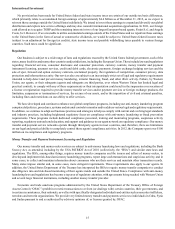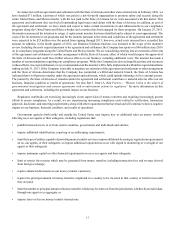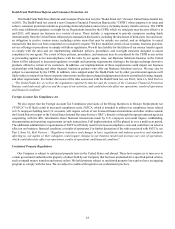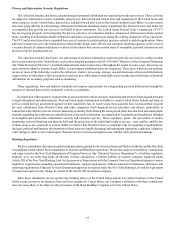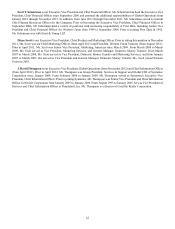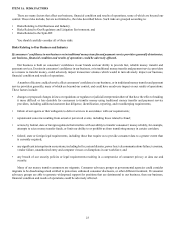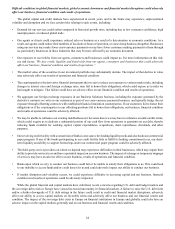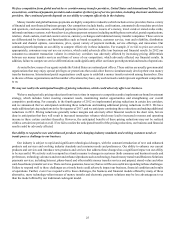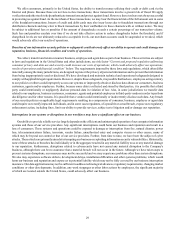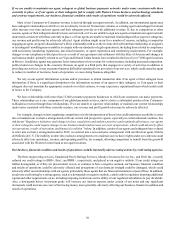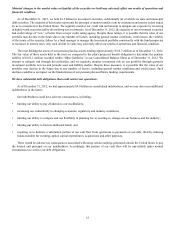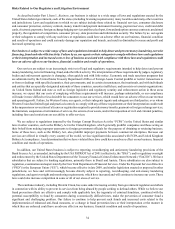Western Union 2012 Annual Report Download - page 29
Download and view the complete annual report
Please find page 29 of the 2012 Western Union annual report below. You can navigate through the pages in the report by either clicking on the pages listed below, or by using the keyword search tool below to find specific information within the annual report.24
Difficult conditions in global financial markets, global economic downturns and financial market disruptions could adversely
affect our business, financial condition and results of operations.
The global capital and credit markets have experienced in recent years, and in the future may experience, unprecedented
volatility and disruption and we face certain risks relating to such events, including:
• Demand for our services could soften compared to historical growth rates, including due to low consumer confidence, high
unemployment, or reduced global trade.
• Our agents or clients could experience reduced sales or business as a result of a deterioration in economic conditions. As a
result, our agents could reduce their numbers of locations or hours of operation, or cease doing business altogether. Businesses
using our services may make fewer cross-currency payments or may have fewer customers making payments to them through
us, particularly businesses in those industries that may be more affected by an economic downturn.
• Our exposure to receivables from our agents, consumers and businesses could impact us. For more information on this risk,
see risk factor, “We face credit, liquidity and fraud risks from our agents, consumers and businesses that could adversely
affect our business, financial condition and results of operations.”
• The market value of the securities in our investment portfolio may substantially decline. The impact of that decline in value
may adversely affect our results of operations and financial condition.
• The counterparties to the derivative financial instruments that we use to reduce our exposure to various market risks, including
changes in interest rates and foreign exchange rates, may fail to honor their obligations, which could expose us to risks we
had sought to mitigate. That failure could have an adverse effect on our financial condition and results of operations.
• We aggregate our foreign exchange exposures in our Business Solutions business, including the exposure generated by the
derivative contracts we write to our customers as part of our cross-currency payments business, and typically hedge the net
exposure through offsetting contracts with established financial institution counterparties. If our customers fail to honor their
obligations or if the counterparties to our offsetting positions fail to honor their obligations, our business, financial condition
and results of operations could be adversely affected.
• We may be unable to refinance our existing indebtedness as it becomes due or we may have to refinance on unfavorable terms,
which could require us to dedicate a substantial portion of our cash flow from operations to payments on our debt, thereby
reducing funds available for working capital, capital expenditures, acquisitions, share repurchases, dividends, and other
purposes.
• Our revolving credit facility with a consortium of banks is one source for funding liquidity needs and also backs our commercial
paper program. If any of the banks participating in our credit facility fails to fulfill its lending commitment to us, our short-
term liquidity and ability to support borrowings under our commercial paper program could be adversely affected.
• The third-party service providers on whom we depend may experience difficulties in their businesses, which may impair their
ability to provide services to us and have a potential impact on our own business. The impact of a change or temporary stoppage
of services may have an adverse effect on our business, results of operations and financial condition.
• Banks upon which we rely to conduct our business could fail or be unable to satisfy their obligations to us. This could lead
to our inability to access funds and/or credit losses for us and could adversely impact our ability to conduct our business.
• If market disruption and volatility occurs, we could experience difficulty in accessing capital and our business, financial
condition and results of operations could be adversely impacted.
While the global financial and capital markets have stabilized, recent concerns regarding U.S. debt and budget matters and
the sovereign debt crisis in Europe have caused increased uncertainty in financial markets. A failure to raise the U.S. debt limit
and/or a further downgrade of U.S. debt ratings in the future could result in credit and financial market disruptions, adversely
affect our ability to access capital markets on favorable terms and adversely affect our business and our financial results and
condition. The impact of the sovereign debt crisis in Europe on financial institutions in Europe and globally could also have an
adverse impact on the capital markets generally and on our business and financial results and condition.



